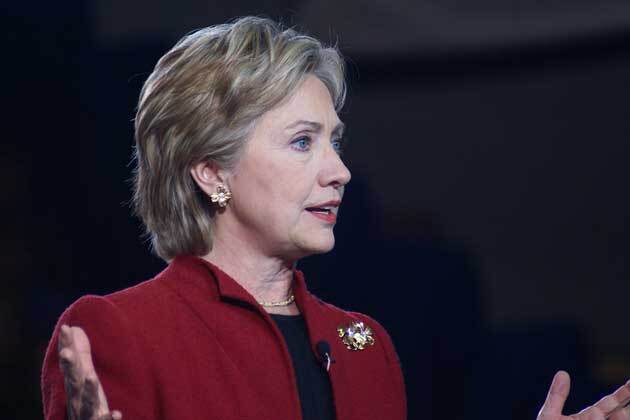Green Group Draws Fire Over Clinton Endorsement

A national environmental group that ranks politicians on their environmental records, has made its earliest presidential endorsement ever -- and it may wish it had waited.
The Washington, DC-based League of Conservation Voters, founded in 1969 by California environmental activist David Brower, lent the endoresment of its affiliated Political Action Committee to Democratic Party presidential aspirant Hillary Clinton on Monday. The endorsement comes earier in the election cycle than any the League has previously bestowed on a candidate, coming a year before the Presidential election and before the Iowa Caucuses have been held.
That has angered supporters of Clinton's main rival for the Democratic nod, Vermont Senator Bernie Sanders, who point out that the League itself assesses Sanders' environmental voting record as significantly stronger than Clinton's, based on the two candidates' votes on significant environmental laws in Congress. The League has given Sanders a lifetime voting record of 95 percent, compared to Clinton's lifetime score of 82 percent.
"When it comes to fighting the climate crisis, the stakes couldn't be higher--and we are confident that Hillary Clinton is the right person for the job," said Gene Karpinski, President of the League's Action Fund -- the PAC that does the League's campaign work. "With her proven history of leadership, strong environmental record, and a campaign committed to building a clean energy future, Hillary Clinton is without a doubt the most effective leader to stand up to Big Polluters and push forward an aggressive plan to tackle climate change and get it done."
Supporters of Sanders, and other critics of Clinton's environmental record, were quick to point out her work as Secretary of State to promote fracking in countries with significant shale gas reserves, as well as her early support for the controversial (and now dead) Keystone XL pipeline project, along with early votes in favor of drilling for oil in the Arctic.
Clinton's work as Secretary of State wouldn't be reflected in her League of Conservation Voters' scorecard ranking, which only tracks votes in Congress. Clinton's 82 percent score covers her two terms in the Senate representing New York State, and includes a 36 percent score in 2008 -- mainly due to votes missed during her last Presidential campaign.
Sanders supporters pointed out in social media that the Vermont Senator's 95 percent rating by the League covers a span nearly three times longer than Clinton's, starting when the former mayor of Burlington, VT took a seat in the House of Representatives in 1991. Sanders' running afoul of the League's position on environmental issues generally happened on issues of symbolic interest to his largely rural constituents, such as restricting snowmobiles in Yellowstone National Park.
One vote of potential interest to Californians: in 1994, Sanders voted to block the formation of a Mojave National Park in order to preserve access to the land for hunters. A compromise in the 1994 California Desert Protection Act made that proposed Park the Mojave National Preserve, where hunting is still allowed.
At any rate, that 13-percent gap in the two candidates' records didn't prevent the League's endorsement, and since Monday the organization has been feeling the heat in social media. Many pointed to donations to the group by staff of Bain Capital and Goldman Sachs as evidence of the League's alleged fealty to the Powers That Be. To be fair, that list of donors includes substantial donations from people not particularly aligned with the 1 percent, such as Patagonia's Malinda Chouinard, who gave $50,000 in the 2014 election cycle.
Nuance in large donor lists notwithstanding, the social media reaction was fierce, and the League's Facebook page now sports hundreds of angry comments from opponents of Clinton, many of them on posts not specifically related to the League's endorsement. For instance, a post decrying the anti-environmental positions of Republican candidates has been adorned with comments like:
When this organization picks a candidate with a lower environmental record, it loses credibility to mock republicans. When it backs a candidate taking money from the fossil fuel industry, and turns it's back on the one with the boldest climate change plans, it loses credibility as an environmental champion. Are we expected to believe that the fossil fuel industry has given money to Hillary Clinton so that she can mess up their business model? Does this organization believe that?
Clinton's fossil fuel industry support also received mention in the reaction to the endorsement on Twitter, as for example:
Isn't this the candidate that just got endorsed by the League of Conservation Voters? Says as much about the LCV... https://t.co/3wv070jVDj
— Curtis Vause (@sorryinputerror) November 10, 2015
For its part, the League seemed to shift smoothly into damage control mode after mid-day Tuesday, with staff doubling down on their support of the Democratic frontrunner. "It's not about him. It's about her. We think she is the best candidate to run against the eventual Republican nominee, and we think she is the best person to be president because she has the skills and experience to be incredibly effective," said the League's senior vice president for government affairs Tiernan Sittenfeld, in an interview with Yahoo News.
Despite the dozens of social media commenters threatening to withhold further donations from the League, it's likely the group will weather this reaction without much trouble. But the furor does highlight an ever-deepening divide in the American environmental movement, between well-funded "establishment" green groups and the grassroots groups that constitute the core of Sanders' environmentalist constituency. Regardless of which of the two candidates gets their party's nod at the convention, that larger division is only getting deeper.




